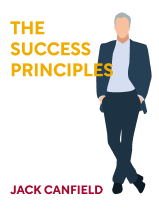

This article is an excerpt from the Shortform book guide to "The Success Principles" by Jack Canfield. Shortform has the world's best summaries and analyses of books you should be reading.
Like this article? Sign up for a free trial here .
Can you really fake it to make it? How does acting as though you’ve already achieved your dream help you push through towards it?
The expression “fake it till you make it” might sound cliche, but it’s a powerful way to expedite the journey towards your goals. When you act as though you’ve already achieved your dream, you’ll become better at discerning the opportunities that can help you get there.
Here’s how you can start acting as though you’ve already achieved your goals using the “fake it to make it” method
How Would You Act if You’d Already Made It?
One powerful technique to achieving your goals is to “fake it to make it”, that is to act as though you already have. In the same way that visualization stimulates your reticular activating system (RAS), acting as though you’ve already achieved your dream activates the Law of Attraction: You start recognizing the people and opportunities that might help you reach your goals.
To start acting as though you’ve achieved your goals, think about how your life would be different. Consider:
- How you’d feel
- How you’d think
- How you’d talk
- What you’d wear
You can also try to model the behaviors of successful people. Successful people tend to:
- Be self-confident
- Celebrate their accomplishments
- Feel comfortable taking risks
- Say what they want and don’t want
- Think they can achieve anything
Throw a “Come as You’ll Be” Party
To practice acting as though you’ve achieved your goals, plan or attend a “Come as You’ll Be” party: a party set five years in the future where you act as if you’ve achieved your goals. Canfield first attended one in 1986. Participants had to act in character for the entire four-hour party. They brought props, like “books” they had written and photos of themselves achieving their goals.
One participant, Susan Jeffers, brought three books she had written, though she had yet to publish even one. When Jeffers shared that she had published these books, attendees responded that they’d seen her interviews on popular talk shows. Another attendee who was an aspiring stock trader had someone call him every 15 minutes. He’d talk animatedly and then give commands about whether to buy or sell shares. Canfield carried copies of his yet-to-be-written New York Times bestseller.
Most of the party’s attendees went on to achieve their dreams, including Canfield. He attributes their success to marinating their brains in the imagery of achievement for four hours, which in turn activated their RAS and motivated them to achieve the goal. The attendees had to put in concerted effort going forward to reach those goals, but the party provided an important starting point.
Throw a Come as You’ll Be Party for your close friends, or consider making it part of your company’s training program. You’ll create a supportive jumping-off point for the people around you who are looking to propel themselves toward their goals.
Acting the Part: From Bank Teller to Branch Manager
When Canfield visited his local bank, he usually saw one teller who was more dressed up than the others. Instead of wearing just a shirt and tie, he wore a suit like the managers. Over the course of a few years, this employee went from teller to loan salesman with his own desk, to loan officer, to branch manager. When Canfield asked him about it, he said he’d planned to become the branch manager. In preparation for the role, he’d studied how the managers dressed and how they treated employees and customers. He studied and acted the part long before reaching his goal.
Success in the PGA: Jim Nantz and Fred Couples’s Story
In college, Fred Couples and Jim Nantz discovered that they both wanted to make it big in the golf world. Couples wanted to become pro-golfer and win the Masters Tournament while Nantz wanted to become a sports announcer for CBS. They role-played Couples winning the tournament and Nantz interviewing him countless times. Over a decade later, Couples succeeded in winning the tournament and Nantz was his interviewer, just like they’d practiced. Acting as though they’d already succeeded put both men on the path to making it come true.

———End of Preview———
Like what you just read? Read the rest of the world's best book summary and analysis of Jack Canfield's "The Success Principles" at Shortform .
Here's what you'll find in our full The Success Principles summary :
- The 67 principles to help anyone achieve their goals and dreams
- Why achieving your goals requires you to invest your time and effort
- How to take responsibility for your own life






